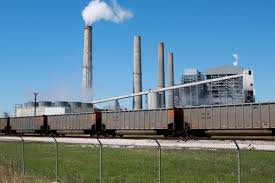
WASHINGTON U.S - Market with regard to the dirtiest of non-renewable fuels is plummeting worldwide, based on industry data published Tues, even as President Donald Trump has made reviving the long-struggling U. S. coal mines, the bedrock of the administration's energy policy.
The actual BP Statistical Review of Globe Energy shows global fossil fuel production fell by greater than 6 percent last year. Which is the largest decline in the historical past of BP's survey, that the British energy company offers issued annually for more than 60 years.
It is the second straight 12 months that coal demand has dropped. Production at U. S. coal mines fell through 19 percent. China's fossil fuel production fell by almost 8 percent.
On the whole, coal's share of global energy usage fell to 28 percent, the cheapest since 2004.
The numbers reveal the trend of nations shunning fossil fuel in favor of cheaper, cleaner methods for producing electricity - primarily natural gas, wind and solar energy.
Trump announced earlier in may he will withdraw the United States through the Paris climate accord. The actual agreement signed by 195 nations in 2015 should decrease global carbon emissions in an effort to head off the most severe predicted effects of global warming, such as worsening storms, catastrophic droughts and city-drowning sea levels rise.
As Trump increases down on coal, the rest of the world seems headed in the opposite path.
Renewable energy made big benefits growing 14 percent within 2016. More than half that expansion came for new wind turbines. China in the far east, where the government in trading hundreds of billions in green electricity programs, overtook the United States since the world's largest producer associated with renewable energy.
With coal's decline, growth in planet-warming co2 and also carbon emissions has flattened even while global demand for energy is constantly on the rise. CO2 emissions through energy consumption increased through only 0. 1% within 2016. Since 2014, the typical emissions growth has been the cheapest over any three-year time period since the early 1980s.
